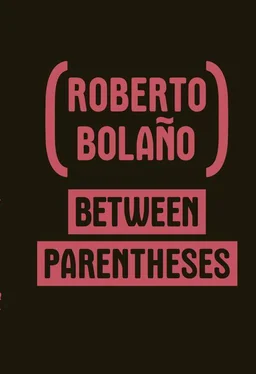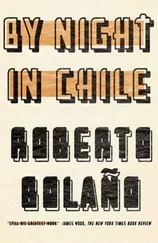Roberto Bolaño - Between Parentheses - Essays, Articles and Speeches, 1998-2003
Здесь есть возможность читать онлайн «Roberto Bolaño - Between Parentheses - Essays, Articles and Speeches, 1998-2003» весь текст электронной книги совершенно бесплатно (целиком полную версию без сокращений). В некоторых случаях можно слушать аудио, скачать через торрент в формате fb2 и присутствует краткое содержание. Год выпуска: 2011, Издательство: New Directions, Жанр: Публицистика, Критика, на английском языке. Описание произведения, (предисловие) а так же отзывы посетителей доступны на портале библиотеки ЛибКат.
- Название:Between Parentheses: Essays, Articles and Speeches, 1998-2003
- Автор:
- Издательство:New Directions
- Жанр:
- Год:2011
- ISBN:нет данных
- Рейтинг книги:4 / 5. Голосов: 1
-
Избранное:Добавить в избранное
- Отзывы:
-
Ваша оценка:
- 80
- 1
- 2
- 3
- 4
- 5
Between Parentheses: Essays, Articles and Speeches, 1998-2003: краткое содержание, описание и аннотация
Предлагаем к чтению аннотацию, описание, краткое содержание или предисловие (зависит от того, что написал сам автор книги «Between Parentheses: Essays, Articles and Speeches, 1998-2003»). Если вы не нашли необходимую информацию о книге — напишите в комментариях, мы постараемся отыскать её.
The Savage Detectives
Between Parenthese
Between Parentheses: Essays, Articles and Speeches, 1998-2003 — читать онлайн бесплатно полную книгу (весь текст) целиком
Ниже представлен текст книги, разбитый по страницам. Система сохранения места последней прочитанной страницы, позволяет с удобством читать онлайн бесплатно книгу «Between Parentheses: Essays, Articles and Speeches, 1998-2003», без необходимости каждый раз заново искать на чём Вы остановились. Поставьте закладку, и сможете в любой момент перейти на страницу, на которой закончили чтение.
Интервал:
Закладка:
A PERFECT STORY
A while ago, at a lunch with Nicanor Parra, the poet made mention of the stories of Saki, especially one of them, “The Open Window,” which is part of the book Beasts and Super-Beasts . The great Saki’s real name was Hector Hugh Munro and he was born in 1870 in Burma, which in those days was a British colony. His stories, heavily seasoned with black humor, generally belong to the genre of horror and supernatural fiction, so popular among the British. When World War I broke out, Saki enlisted as a volunteer, a fate he could surely have avoided by virtue of his age (he was over forty), and he died fighting at Beaumont-Hamel in 1916.
During that long postprandial conversation, which lasted until nightfall, I thought about a writer of the same generation as Munro, though stylistically he was very different: the great Max Beerbohm, who was born in London in 1872 and died in Rapallo, Italy, in 1956, and who, in addition to stories, wrote novels, newspaper pieces, and essays, without ever giving up two of his first loves: drawing and caricature. Max Beerbohm may be the paradigm of the minor writer and the happy man. In other words: Max Beerbohm was a good and gracious soul.
When we finally took our leave of Nicanor Parra and the Caleuche and returned to Santiago, I thought about the story that I believe is Beerbohm’s best, “Enoch Soames,” which was included by Silvina Ocampo, Borges, and Adolfo Bioy Casares in the magnificent and often hard to find Antologia de la literatura fantastica [Anthology of Fantastic Literature]. Months later I reread it. The story is about a mediocre and pedantic poet whom Beerbohm meets in his youth. The poet, who has written only two books, one worse than the next, befriends the young Beerbohm, who in turn becomes an involuntary witness to his misfortunes. The story thus becomes not just a testament to the life of all poor fools who in a moment of madness choose literature, but to late nineteenth-century London. Thus far, of course, it’s a comic tale, vacillating between naturalism and reportage (Beerbohm appears under his real name, as does Aubrey Beardsley), between satire and the broad brushstrokes of costumbrismo . But suddenly everything changes, absolutely changes. The critical moment comes when Enoch Soames, lost in thought, glimpses his mediocrity. He’s seized by despair and apathy. One afternoon Beerbohm runs into him at a restaurant. They talk, and the young narrator tries to cheer up the poet. He points out that Soames’s financial situation is all right, he can live on his income for the rest of his life, maybe he just needs a holiday. The bad poet confesses that all he wants to do is kill himself and that he would give anything to know whether his name will live on. Then someone at the next table, a man with the look of a scoundrel or miscreant, asks permission to join them. He introduces himself as the Devil and he promises that if Soames sells him his soul he’ll send him into the future, say one hundred years, to 1997, to the British Library Reading Room where Soames often goes to work, so he can see for himself, in situ , whether his name has stood the test of time. Despite Beerbohm’s pleas, Soames accepts. Before he leaves he agrees to meet Beerbohm again at the same restaurant. The next few hours are described like something out of a dream — a nightmare — in a Borges story. When at last they meet again, Soames is as pale as death. He really has traveled to the future. He couldn’t find his name in any encyclopedia, any index of English literature. But he did find the Beerbohm story called “Enoch Soames,” in which, among other things, he’s mocked. Then the Devil comes and takes him away to hell, despite Beerbohm’s efforts to stop him.
In the last lines there’s still a final surprise, having to do with the people Soames claims to have seen in the future. And there’s yet another surprise, this one much smaller, concerning paradoxes. But these two final surprises I’ll leave to the reader who buys the Antología de la literatura fantástica or who rifles through libraries in search of it. Personally, if I had to choose the fifteen best stories I’ve read in my life, “Enoch Soames” would be among them, and not in last place.
ALPHONSE DAUDET
Time passes at dizzying speed. When I was an adolescent and I lived in the south of Chile, I discovered Daudet, Alfonso Daudet, as he was called then, his name Hispanicized to make it more familiar, though I’ve never heard of Charles Baudelaire or Paul Verlaine being called Carlos Baudelaire or Pablo Verlaine.
Reading Daudet back then was (and still is) a pleasure and a luxury that only an adolescent lost at the end of the world could fully appreciate, with the happy sense of license that comes after a perfect theft and the feeling of freedom derived from smoking one’s first cigarettes, outside under a tree on a rainy afternoon. His books have accompanied me ever since, especially Tartarin of Tarascon , a treatise on the joy of living which can be ridiculous at times, though it isn’t unusual to come upon the truth, hidden beneath the ridiculous, a brave, relative truth containing great doses of epicureanism; and also Letters from my Mill , a collection of cameos and miscellaneous prose to which the early work of Arreola is much indebted; or the Memoirs , a melancholy book in which Daudet, so well sketched by Jules Renard in his Journal , doesn’t lecture on the human and the divine but rather glides, like a sleepwalker, from the human to the divine, from Cartesian clarity to pure song, from the useful to the useless, and even from the useless to the useless, this last a feat worthy of real writers; or The Nabob , a reflection on the figure of a politician; or L’Arlesienne , which Bizet set to music; not to forget the sequels to the unforgettable Tartarin: Tartarin on the Alps and Port Tarascon .
Daudet was a friend of Victor Hugo, whose work he admired, and yet he didn’t allow Hugo’s titantic force to negatively influence his own work, which is much lighter, more delicate, approaching at moments the naturalism of Zola and Maupassant. Despite his prestige and success, he always saw himself as a lesser writer, easy to like. In other words, he never took himself too seriously. He was generous and, according to his contemporaries, lacking in envy, a sentiment all too common in the backbiting world of letters (which pretends to be so civilized). He loved his children. One of them, León Daudet, born in 1867, when his father was twenty-seven, became a writer, and his works rank among the worst of French literature, though it would’ve hurt his father more to know that in 1907, his crooked offspring would found, with Maurras, the Action Française, organ of the far right and seed of French fascism. But Alfonso Daudet didn’t live to see it. He died in 1897, after suffering from a nervous complaint for many years. Today, in the south of Chile, almost no one reads Daudet. Not even writers, to whom Daudet sounds vaguely like the name of a pop singer or balladeer.
JONATHAN SWIFT
Why does an author become a classic? Certainly not because he writes well; if that were the case, the world of literature would be overpopulated with classics.
A classic, as it’s most commonly defined, is a writer or work that not only permits multiple readings but ventures into new territory and in some way enriches (that is, illuminates) the tree of literature and smooths the path for those who follow. A classic is the writer or work able to decode and reorder the canon (usually not a book that’s considered required reading, at least from a small-minded perspective). And then there are those classics whose main virtue, whose elegance and validity, is symbolized by the time bomb: a bomb that not only hurtles perilously through its age but is capable of flinging itself into the future. It’s to this latter category — though the two categories aren’t mutually exclusive — that Jonathan Swift belongs, and it’s from the very rich and varied Swiftean oeuvre that the publishing house Península has recently culled a selection of fragments, published under the title Ideas para sobrevivir a la conjura de los necios [Ideas for Surviving the Confederacy of Dunces].
Читать дальшеИнтервал:
Закладка:
Похожие книги на «Between Parentheses: Essays, Articles and Speeches, 1998-2003»
Представляем Вашему вниманию похожие книги на «Between Parentheses: Essays, Articles and Speeches, 1998-2003» списком для выбора. Мы отобрали схожую по названию и смыслу литературу в надежде предоставить читателям больше вариантов отыскать новые, интересные, ещё непрочитанные произведения.
Обсуждение, отзывы о книге «Between Parentheses: Essays, Articles and Speeches, 1998-2003» и просто собственные мнения читателей. Оставьте ваши комментарии, напишите, что Вы думаете о произведении, его смысле или главных героях. Укажите что конкретно понравилось, а что нет, и почему Вы так считаете.












